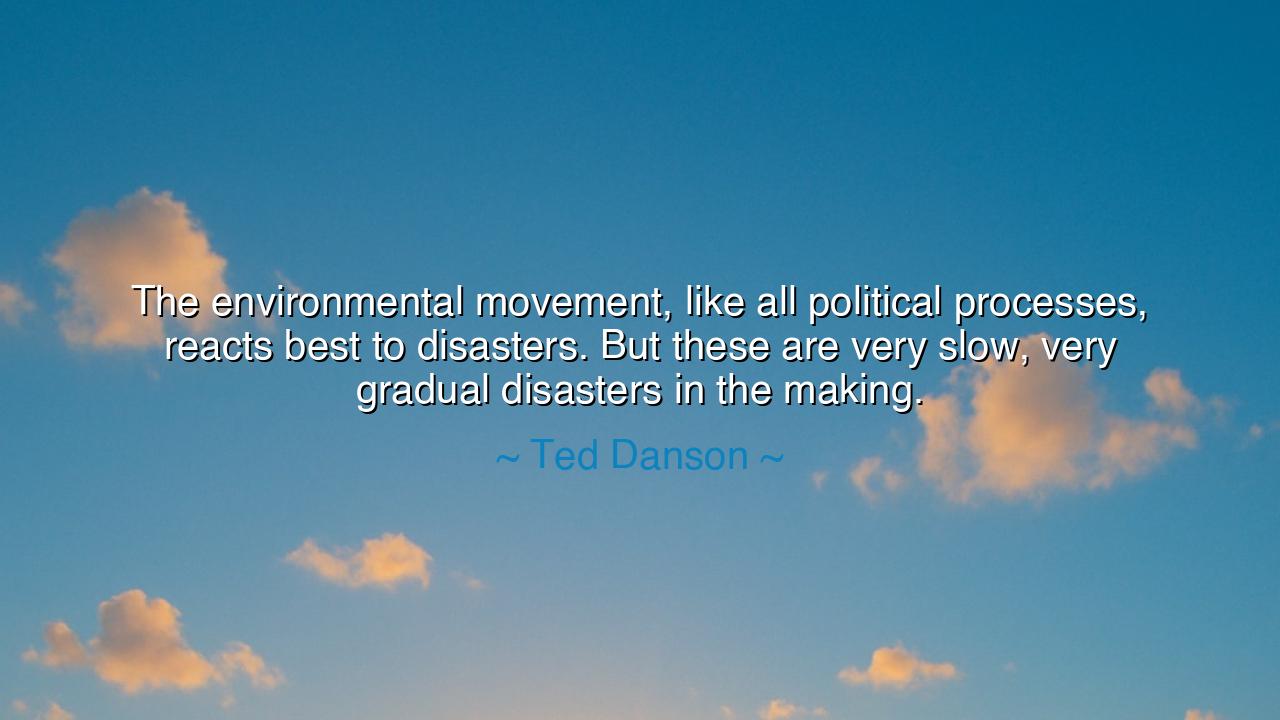
The environmental movement, like all political processes, reacts
The environmental movement, like all political processes, reacts best to disasters. But these are very slow, very gradual disasters in the making.






Hear the words of Ted Danson, who, though known as an actor, became also a herald for the seas and a defender of the earth: “The environmental movement, like all political processes, reacts best to disasters. But these are very slow, very gradual disasters in the making.” In these words lies both sorrow and warning, for he reveals the tragic weakness of mankind: that we awaken most swiftly when calamity strikes like thunder, yet sleep through the silent, creeping dangers that build drop by drop, year by year.
He speaks first of the environmental movement, the gathering of voices that seek to shield the earth from destruction. Like the cry of prophets, these movements rise most powerfully in times of visible crisis: when rivers burn with oil, when cities choke with smog, when seas are fouled by oil spills. In those moments, the people rally, the rulers take notice, and laws are written. But Danson warns that many of the earth’s wounds are not sudden. They are slow disasters, creeping beneath the surface, invisible to the eye of the impatient, yet no less deadly.
Consider the tale of the Aral Sea in Central Asia. Once a vast inland sea, it fed fishermen and nurtured communities. Yet through decades of irrigation projects, its waters were drained away. At first the change was barely noticed: the shoreline receded slowly, year after year. But after a generation, the sea was nearly gone, leaving behind poisoned dust and ruined livelihoods. This was no sudden fire, no earthquake, but a gradual disaster—and by the time it was fully recognized, it was almost too late to reverse.
So too did the Romans witness slow decline. Their soils, exhausted by centuries of cultivation without rest, lost their fertility. Their forests, cut down without thought, turned lush lands into barren ground. At the time, these changes seemed small, barely visible within a single lifetime. Yet across centuries, they weakened the empire’s foundation. Here is the truth Danson speaks: slow disasters are the hardest to see, yet often the most devastating.
The emotional power of his words lies in the tension between reaction and foresight. Humanity is brave in crisis—we rise against the fire and the flood with courage and unity. But we are often blind to the dangers that whisper rather than roar, the threats that unfold not in days, but in decades. Danson, as a voice for the oceans, reminds us that the bleaching of coral reefs, the melting of ice, the decline of fish populations—all are disasters in the making, but too many dismiss them because they lack the spectacle of suddenness.
The lesson, O listener, is this: train your eyes to see beyond the moment. Do not wait for catastrophe to awaken your conscience. Recognize that the gradual disaster is as real as the sudden one, and that the greatest dangers are often those that creep silently until they become irreversible. True wisdom is not only in reacting to the storm, but in preparing long before the clouds gather.
What then shall you do? First, educate yourself and others about the hidden, slow-moving crises: the acidifying oceans, the shrinking forests, the warming climate. Second, act early, even when the danger seems far away—reduce waste, support sustainable practices, and urge leaders to take foresight over convenience. Third, cultivate patience, for victories against gradual disasters come not in days but in decades.
And remember always: as Ted Danson declared, the environmental movement reacts best to disasters, but many disasters unfold slowly. Do not be lulled by their silence. Watch, act, and endure, for in choosing vigilance over delay, you may save not only the present generation but the countless lives of those yet to come. The slow disaster can be stopped only by those who choose to act before the roar of its final collapse.






AAdministratorAdministrator
Welcome, honored guests. Please leave a comment, we will respond soon